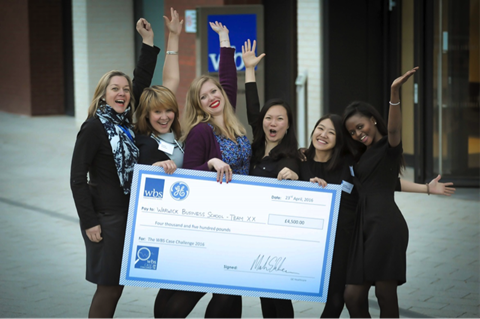The annual gathering of MBA students to devise healthcare solutions this year tackled dementia - find out who won…


Last month saw GE Healthcare and GE Healthcare Finnamore once again join Warwick Business School for two days for the annual Healthcare Case Study Challenge.
The competition brings together teams of MBA students from around the world to develop and present innovative solutions to some of today’s greatest healthcare challenges, with this year’s competition focusing on dementia.
‘Team XX’ from Warwick Business School were awarded the £4,500 prize by a panel of 11 expert judges. The team of Nyanya Joof, Valeriya Balashova, Louise Parker, Rajitkaew Jiamratanapratip, Ying Hu and Wendy Hutcheon beat off competition from Birmingham Business School, Cranfield School of Management, London Business School, Nottingham University Business School, Alliance Manchester Business School, Rotterdam School of Management Erasmus University, Said Business School, and SDA Bocconi School of Management.
The competition brings together teams of MBA students from around the world to develop and present innovative solutions to some of today’s greatest healthcare challenges
This year’s challenge focused on preventing inappropriate admission to hospital for dementia sufferers. Whilst it is often recognised that early intervention and support for those with dementia, their carers and families, has sizeable benefits both financially and in terms of outcomes, the majority of the key risks to decompensation are not recognised, and this makes detection difficult.
At the point where a frailty crisis occurs, the resource and intelligence often does not exist locally to provide an effective system response and so prevent admission to acute care.
Many healthcare organisations have recognised this challenge and are now designing solutions at a system level to redesign pathways of care for frail older people. The shift to early intervention will ultimately mean that a larger degree of control and involvement in planning and care management will sit with the patient, family and carers.
Detection and education are critical enablers to empower these groups, and ensuring that they can be undertaken as effectively as possible presents a clear opportunity to harness innovative and technology-enabled solutions. This was the context and the challenge presented for the twelve shortlisted teams to address.
The winners
Team XX described an innovative approach to early detection of urinary tract infection (UTI), which is a common trigger for emergency admission in older people in general, but particularly in dementia - 14 per cent of emergency admissions are for UTI. Older patients with cognitive impairment often find it difficult to recognise and articulate symptoms, which can lead to late recognition by carers that there is a problem.
At the point where a frailty crisis occurs, the resource and intelligence often does not exist locally to provide an effective system response and so prevent admission to acute care
Early signs of urinary tract infection are easy to miss, even for experienced healthcare staff, and late recognition may result in unavoidable admission with sepsis, a long stay in hospital with the attendant difficulties of disorientation and anxiety and the potential for significant loss of function which may not be regained. This leads to the risk of the need for a higher level of care at an earlier point in the progress of the dementia.
Team XX identified early detection of a UTI, even before symptoms have emerged, as a critical factor in maintaining older patients at home for longer. They applied a simple existing technological solution in an innovative way to a very common problem with extensive potential benefits for patients, carers and the health care system.
A gel dot applied to the toilet surface in a similar way to commercially available disinfectants would be the vehicle for a colour change reagent which reacts to the presence of nitrite or leucocytes in urine. These reagents are currently available in dipstick test kits which are used by healthcare workers to identify the presence of infection.
Colour change would trigger a formal urine sample being sent to the patient’s GP to be tested for the presence of infection. This intervention may potentially bring forward diagnosis by days rather than hours and result in the ability to treat with the appropriate antibiotic when the patient is still at home.
The case study challenge is a fantastic opportunity, which showcases the depth and breadth of thinking from some of the brightest minds from global business schools
Nyanya, from the winning team said: “I feel a great sense of achievement winning the case challenge, especially being part of such a fantastic team. The competition educated me about dementia and helped me face this very pertinent issue that affects the world over.
GE Healthcare Finnamore’s Emily Byrne was one of the expert advisory group available to the students as they were developing their ideas. She said: “The case study challenge is a fantastic opportunity, which showcases the depth and breadth of thinking from some of the brightest minds from global business schools.
”Each team took on the challenge with energy and passion, and despite the focus on innovation and intervention it was heartening to see how many teams had not lost sight of the devastating impact this disease has on patients, carers and families alike.”

























No comments yet